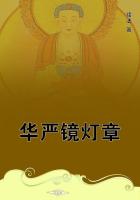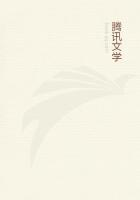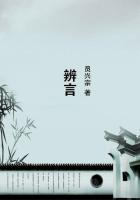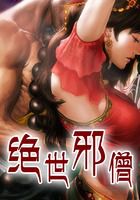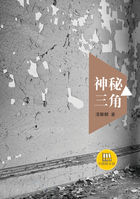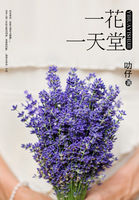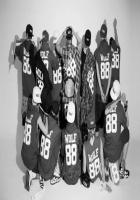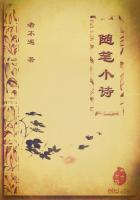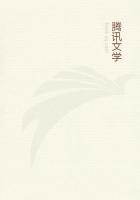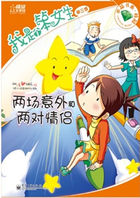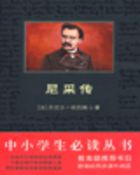'We were driven South by a storm, and for three days and three nights he took the stern-oar, and threddled the longship through the sea. When it rose beyond measure he brake a pot of whale's oil upon the water, which wonderfully smoothed it, and in that anointed patch he turned her head to the wind and threw out oars at the end of a rope, to make, he said, an anchor at which we lay rolling sorely, but dry. This craft his father Guthrum had shown him. He knew, too, all the Leech-Book of Bald, who was a wise doctor, and he knew the Ship-Book of Hlaf the Woman, who robbed Egypt. He knew all the care of a ship.
'After the storm we saw a mountain whose top was covered with snow and pierced the clouds. The grasses under this mountain, boiled and eaten, are a good cure for soreness of the gums and swelled ankles. We lay there eight days, till men in skins threw stones at us. When the heat increased Witta spread a cloth on bent sticks above the rowers, for the wind failed between the Island of the Mountain and the shore of Africa, which is east of it. That shore is sandy, and we rowed along it within three bowshots. Here we saw whales, and fish in the shape of shields, but longer than our ship. Some slept, some opened their mouths at us, and some danced on the hot waters. The water was hot to the hand, and the sky was hidden by hot, grey mists, out of which blew a fine dust that whitened our hair and beards of a morning. Here, too, were fish that flew in the air like birds. They would fall on the laps of the rowers, and when we went ashore we would roast and eat them.'
The knight paused to see if the children doubted him, but they only nodded and said, 'Go on.'
'The yellow land lay on our left, the grey sea on our right. Knight though I was, I pulled my oar amongst the rowers. I caught seaweed and dried it, and stuffed it between the pots of beads lest they should break. Knighthood is for the land. At sea, look you, a man is but a spurless rider on a bridleless horse. I learned to make strong knots in ropes - yes, and to join two ropes end to end, so that even Witta could scarcely see where they had been married. But Hugh had tenfold more sea-cunning than I. Witta gave him charge of the rowers of the left side. Thorkild of Borkum, a man with a broken nose, that wore a Norman steel cap, had the rowers of the right, and each side rowed and sang against the other. They saw that no man Was idle. Truly, as Hugh said, and Witta would laugh at him, a ship is all more care than a Manor.
'How? Thus. There was water to fetch from the shore when we could find it, as well as wild fruit and grasses, and sand for scrubbing of the decks and benches to keep them sweet. Also we hauled the ship out on low islands and emptied all her gear, even to the iron wedges, and burned off the weed, that had grown on her, with torches of rush, and smoked below the decks with rushes dampened in salt water, as Hlaf the Woman orders in her Ship-Book. Once when we were thus stripped, and the ship lay propped on her keel, the bird cried, "Out swords!" as though she saw an enemy. Witta vowed he would wring her neck.'
'Poor Polly! Did he?' said Una.
'Nay. She was the ship's bird. She could call all the rowers by name ... Those were good days - for a wifeless man - with Witta and his heathen - beyond the world's end ... After many weeks we came on the great Shoal which stretched, as Witta's father had said, far out to sea. We skirted it till we were giddy with the sight and dizzy with the sound of bars and breakers, and when we reached land again we found a naked black people dwelling among woods, who for one wedge of iron loaded us with fruits and grasses and eggs. Witta scratched his head at them in sign he would buy gold. They had no gold, but they understood the sign (all the gold-traders hide their gold in their thick hair), for they pointed along the coast. They beat, too, on their chests with their clenched hands, and that, if we had known it, was an evil sign.'
'What did it mean?' said Dan.
'Patience. Ye shall hear. We followed the coast eastward sixteen days (counting time by sword-cuts on the helm-rail) till we came to the Forest in the Sea. Trees grew there out of mud, arched upon lean and high roots, and many muddy waterways ran allwhither into darkness, under the trees. Here we lost the sun. We followed the winding channels between the trees, and where we could not row we laid hold of the crusted roots and hauled ourselves along. The water was foul, and great glittering flies tormented us. Morning and evening a blue mist covered the mud, which bred fevers. Four of our rowers sickened, and were bound to their benches, lest they should leap overboard and be eaten by the monsters of the mud. The Yellow Man lay sick beside the Wise Iron, rolling his head and talking in his own tongue. Only the Bird throve. She sat on Witta's shoulder and screamed in that noisome, silent darkness. Yes; I think it was the silence we most feared.'
He paused to listen to the comfortable home noises of the brook.
'When we had lost count of time among those black gullies and swashes we heard, as it were, a drum beat far off, and following it we broke into a broad, brown river by a hut in a clearing among fields of pumpkins. We thanked God to see the sun again. The people of the village gave the good welcome, and Witta scratched his head at them (for gold), and showed them our iron and beads. They ran to the bank - we were still in the ship - and pointed to our swords and bows, for always when near shore we lay armed. Soon they fetched store of gold in bars and in dust from their huts, and some great blackened elephants' teeth. These they piled on the bank, as though to tempt us, and made signs of dealing blows in battle, and pointed up to the tree-tops, and to the forest behind. Their captain or chief sorcerer then beat on his chest with his fists, and gnashed his teeth.
'Said Thorkild of Borkum: "Do they mean we must fight for all this gear?" and he half drew sword.
"'Nay," said Hugh. "I think they ask us to league against some enemy."
"'I like this not," said Witta, of a sudden. "Back into mid-stream."

